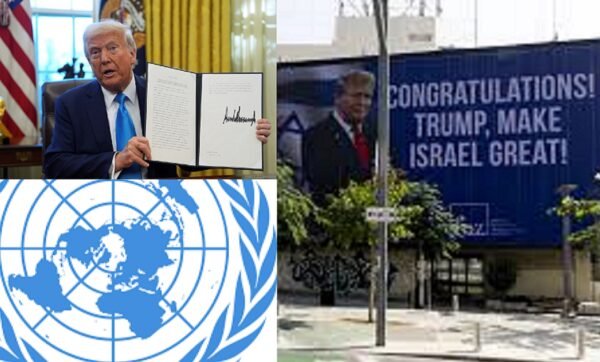US will ‘take over’ and ‘own’ Gaza Strip, Trump announces withdrawal from UN human rights body and halt to funding for Palestinian refugees

President Donald Trump has announced a controversial plan for the United States to “take over” and “own” the Gaza Strip, pledging to rebuild and develop the region. This declaration came during a joint press conference with Israeli Prime Minister Benjamin Netanyahu on February 4, 2025. Trump stated, “The US will take over the Gaza Strip, and we will do a job with it too,” emphasizing that the U.S. would be responsible for dismantling unexploded bombs and other hazards in the area.
Economic Development: Trump described his vision for transforming Gaza into a prosperous area, claiming it could create “thousands and thousands of jobs” and become a source of pride for the Middle East. He referred to Gaza as a “demolition site” that needs to be leveled and rebuilt, suggesting that it could be developed into a luxurious destination akin to “the Riviera of the Middle East”.
Displacement of Palestinians: Trump proposed that the approximately 2 million Palestinians currently living in Gaza should evacuate to neighboring countries such as Jordan and Egypt. He implied that these individuals could find better living conditions elsewhere, stating they could occupy “all of a beautiful area with homes and safety” in those nations.
Legal Authority Questions: Despite his ambitious plans, Trump did not clarify under what legal authority the U.S. would assume control of Gaza. When pressed about the legality of such actions, he avoided providing a direct answer.
Netanyahu’s Support: Prime Minister Netanyahu did not dismiss Trump’s proposal, suggesting it could be a historically significant move. He expressed interest in pursuing this avenue further.
This announcement comes at a sensitive time following the ceasefire agreement between Israel and Hamas, which has been fragile since it was brokered in January 2025. The situation in Gaza remains complex due to ongoing tensions and humanitarian concerns following years of conflict. Trump’s remarks have sparked significant debate regarding the future of Palestinian territories and the implications of U.S. involvement in such a contentious geopolitical issue.
Trump’s Withdrawal from UN Human Rights Council: President Donald Trump announced on February 4, 2025, that the United States will withdraw from the United Nations Human Rights Council (UNHRC). This decision coincided with Israeli Prime Minister Benjamin Netanyahu’s visit to the White House, during which Trump is expected to discuss various issues, including the ongoing conflict in Gaza. Trump’s administration had previously withdrawn from the UNHRC in 2018, citing its perceived bias against Israel.
Funding Halt for Palestinian Refugees: Alongside the withdrawal from the UNHRC, Trump declared that the U.S. will not resume funding for the United Nations Relief and Works Agency (UNRWA), which provides aid to Palestinian refugees. This funding freeze follows allegations from Israel that UNRWA was harboring Hamas militants involved in attacks against Israel, claims that UNRWA has denied. The U.S. had previously been the largest donor to UNRWA but halted its contributions after accusations emerged in late 2023.
Context of Trump’s Actions: Trump’s announcement aligns with a broader strategy of distancing the U.S. from international organizations that he perceives as unfairly critical of Israel. His administration’s actions reflect longstanding tensions between Israel and UN agencies, particularly regarding allegations of anti-Israel bias. The U.S. had previously contributed significant funding to UNRWA, which supports millions of Palestinians across multiple regions.
Future Implications: The withdrawal from these bodies and the funding halt are likely to have significant implications for humanitarian efforts in Gaza and the broader Israeli-Palestinian conflict. As a fragile ceasefire persists, UNRWA remains crucial in delivering aid and services to affected populations.
